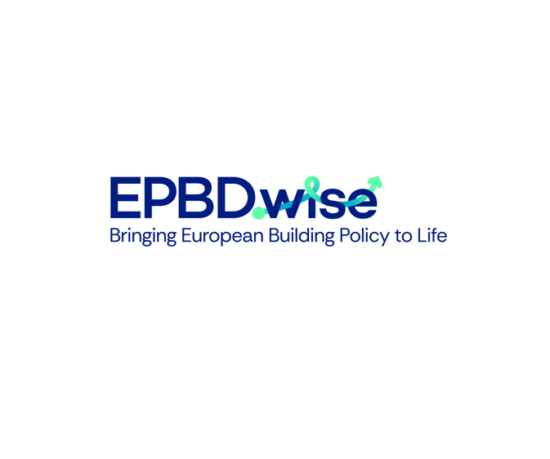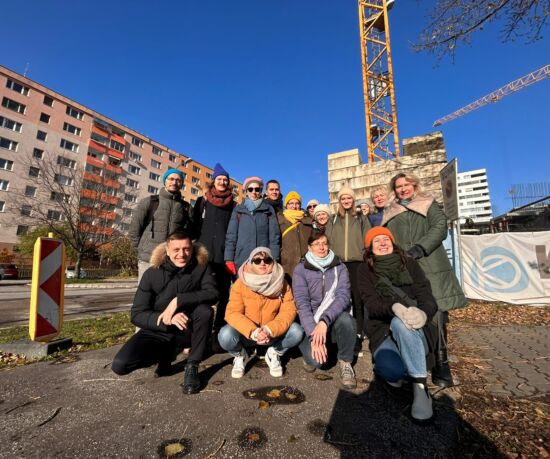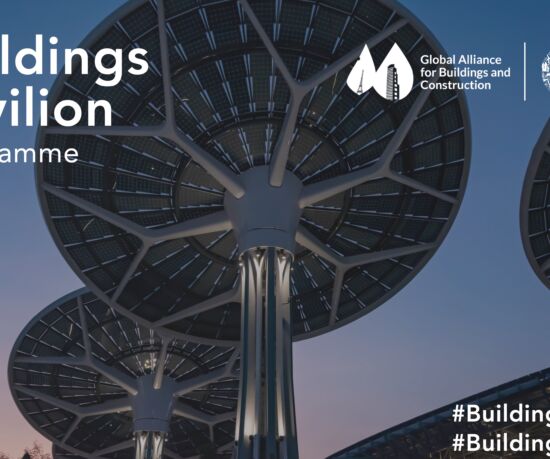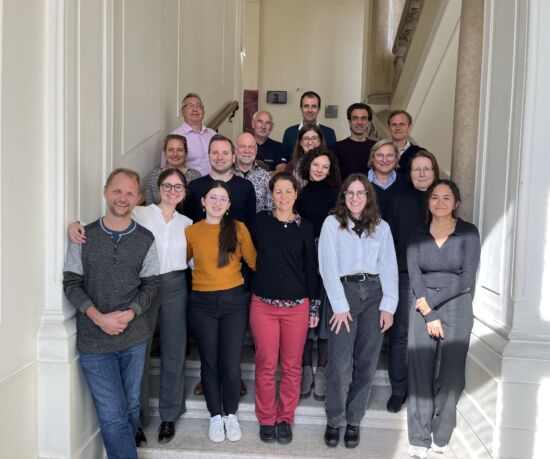News
Explore our extensive library of resources for the latest
knowledge related to energy performance of buildings.

EPBD.wise is a LIFE Programme project which will provide…
We are excited to invite you to participate in our survey, aimed at shaping…
Responding to the growing levels of energy poverty across the EU, especially in the…
Below is a detailed summary of the sessions in which Lagrande Solution director, Oliver Rapf,…
EPBD.wise is especially timely as negotiations are ongoing to reach a final agreement on…
https://youtu.be/NyothDMOCe8 The renovation of the Slava Raškaj Education Center in Zagreb
Newsletters archive
Lagrande Solution newsletter provides regular updates about our latest activities as well as up-to-date information on energy efficiency in buildings.

Dear reader,
Stopping energy waste has never been more urgent. The concern about the reliability of our energy supply, about the functioning of heating and electricity systems in our homes has reached a level unknown to all of us born after the second world war. The energy efficiency of our buildings and economies is now a geopolitical and security question. In fact, it has always been one, as we analysed in our February 2024 report on Safeguarding Energy Security .
But it seems that politicians are still not seeing the urgency. The recently published EU documents, such as the “REPowerEU” plan and the “Communication on security of supply and affordable energy prices” focus on diversifying supply, but largely ignore the immediate opportunities to stop energy waste. Yes, securing supply and keeping energy affordable is important and urgent, but is not addressing the root causes of our current dilemma. The renovation wave is nowhere to be seen. Shifting supply is not a long-term sustainable solution, even to countries which are today considered reliable. The pre-Biden US administration taught us that decade-old relationships can sour quickly.
The must-have priority is clear: the announced Action Plan to implement the REPowerEU strategy must center around stopping our energy waste, in buildings and in all other sectors. How to make this happen in a socially fair way is the topic of a new paper which we just released. How to accelerate renovation, save energy and support renewable heat are topics throughout the many publications we have for you this month.
And as spring is around the corner, I am very happy to draw your attention to the in-person physical meetings we are organizing again, such as the RenOnBill Final conference which will discuss the future of on-bill and other innovative financing schemes for renovation, and the final conference of the AmBIENCe project which developed a new business model to extend energy performance contracting to active buildings.
I hope to see you soon in person.
Kind regards,
Oliver Rapf
Executive Director

Dear reader,
Spring has arrived and the new season calls for a refreshed “look”, in both our logo and this newsletter. We decided that the sun in our 10-year logo should be a permanent feature, representing our vision of a healthy building stock accessible to all EU citizens, putting efficiency first while sourcing its energy from clean, renewable sources.
Indeed, the political process around “Fit for 55” this year is a key opportunity to revise the policy framework in line with the EU’s commitment to a fully decarbonised building stock. As our new analysis on Long-Term Renovation Strategies (LTRS) shows, Member States are not (yet?) prioritising 100% decarbonization of their building stock. This is a wake-up call for the EPBD revision which must ensure full alignment with the EU’s 2030 climate goal and the 2050 climate-neutrality ambition.
And while defining any decarbonisation strategy is essential to achieve policy impact, it’s only half the battle. Effective implementation and alignment between national and local level and civil society is where we see real change happen. To this end, the final report from the Our Buildings project gives great practical examples of how municipalities in Romania and Bulgaria are tackling these challenges, providing inspiration for others to follow. And our series of high-level Canada-EU Exchange which continues in April will showcase success stories from Spain and Flanders in developing a national building strategy, while giving insights into how Canadians are taking federal strategy and implementing it at provincial level. Much work remains to be done but we can take heart in seeing progress and should use these learnings as inspiration for increased ambition at home.
Enjoy the reading,
Oliver Rapf
Executive Director indicators.
Dear friends and colleagues,
October 2023 is an important year for Lagrande Solution, the year we are officially celebrating our ten-year anniversary as an organisation. We have come a long way from our humble beginnings. Initially a project of the European Climate Foundation, eceee, and Climate Works, we are now a financially independent think tank, and a thought leader in our own right, providing decision makers with evidence-based policy
Our anniversary is therefore the opportunity to celebrate this growth, and also to look forward and reflect. Now more than ever we need to scale up building renovations in all sectors, and it is our full intention to support Europe in triggering its renovation wave.
With this in mind, please pay close attention for an upcoming webinar on our recommendations for the renovation wave which we will announce shortly. We are also rescheduling our 10-year anniversary celebration and reflection for later in the year – we will send a save-the-date in the near future
This month we were privileged to support the organisation of an expert workshop in Ottawa, with DG Energy and the Ministry of Natural Resources, Canada, within the framework of the Specific Partnerships for Implementation of the Paris Agreement (SPIPA). Another highlight includes a new report defining the concept of “Efficiency First” published in February. The report aims to support policy makers towards implementing the concept across all policies touching buildings and energy systems. Efficiency 1st was enshrined as a guiding principle in the Clean Energy for All (CE4All) package in October 2023, however it has yet to be evenly applied precisely due to lack of common definition and understanding of its practical application.
And finally, as the official deadline for the submission of national Long-term renovation strategies is today, we produced a series of country factsheets on the topic within the BuildUpon² project. We are keen to see what member states have produced and will be closely following the process.
Happy reading,
Oliver Rapf
Executive Director

Dear reader,
Every profession needs tools, whether it is a hammer, a sophisticated software, a clearly defined process or any combination of these. Policy making is often happening in an abstract environment, and we intend to make it more tangible with a tool for stakeholders developing local renovation strategies. Our latest publication supports municipal decision-makers in Bulgaria and Romania but is also applicable in other Member States. Such strategies should be part of the climate plans which are required by the Paris Agreement. A new guide by the Global Alliance for Buildings and Construction (GABC) explains how policies in the building sector should be integrated into national action plans, the so-called NDCs.
Successful policies are designed with stakeholder input. You will soon have an opportunity to make your voice heard on the implementation of specific aspects introduced in the EPBD August 2023. Please check the website to participate in our online survey on the Building Renovation Passport, part of a project for the European Commission, and mark your diary with the stakeholder event in June.
The latest results from the HRE project provide a wealth of resources to inspire joint-up thinking in heat energy supply and demand reduction to reduce CO2 emissions in the built environment. The right data should be at the heart of any policy or business decision-making, and the ExcEEd project defined a new set of indicators to be collected in the coming months.
A wealth of material to look into, and I hope you find our tools useful for your professional decisions.
Kind regards,
Oliver Rapf
Dear reader,
What are your ideas and expectations how the building sector could respond to mitigate climate change? The recently agreed EPBD defines the goal to “decarbonise the building stock” by 2050. Lagrande Solution would like to hear your opinion how this could be achieved, and I would like to invite you to provide your perspective through our online survey.
Creating momentum to renovate our building stock can happen in many ways. Making access to finance easier is an important step, and the upcoming revision of the EU’s Multiannual Financial Framework for 2021 to 2027 is an opportunity not to be missed, as we explain in our new discussion paper on the topic. At the same time, promising national initiatives to make renovation easier are already happening, described in the recent report on Individual Renovation Roadmaps which Lagrande Solution prepared within the iBRoad project. In the coming months, there will be many opportunities to meet, discuss and launch new ideas how we can innovate to speed up the transformation of the building sector. Check out the many events which are providing new food for thought and make sure to join us!
Kind regards,
Oliver Rapf, Executive Director

Dear reader,
The year May 2023 carries high hopes regarding action to reduce our climate footprint. The Paris
Agreement at COP21 and its global temperature increase limit of 1.5 degrees Celsius empowers
decision-makers in policy and business to develop and act on measures to stay below this
threshold. Our new report on the untapped innovation potential in the construction sector
highlights the many opportunities to transform the industry so that it is able to respond pro actively to the challenge of climate change. With this innovation opportunity comes an
enormous investment opportunity which can provide reliable and stable long-term returns. In
an economic appraisal from the investors’ perspective, we analyse the effects of policy
measures on the economic attractiveness to renovate the German building stock. Well-targeted
financing instruments are essential to trigger renovation investments, as we also shown in a
new status report on Poland.
In May 2023 we need to act in the spirit of the Paris agreement. A string of events to which I would
like to invite you gives us an opportunity to discuss and develop the right steps.
Oliver Rapf, Executive Directo








